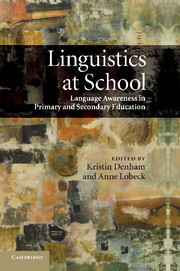Book contents
- Frontmatter
- Contents
- Notes on contributors
- Foreword: The challenge for education
- Introduction
- Part I Linguistics from the top down: encouraging institutional change
- Part II Linguistics from the bottom up: encouraging classroom change
- Introduction to Part II
- 9 From cold shoulder to funded welcome: lessons from the trenches of dialectally diverse classrooms
- 10 Positioning linguists as learners in K-12 schools
- 11 Fostering teacher change: effective professional development for sociolinguistic diversity
- 12 On promoting linguistics literacy: bringing language science to the English classroom
- 13 Linguistics in a primary school
- 14 Educating linguists: how partner teaching enriches linguistics
- 15 The Linguistic Olympiads: academic competitions in linguistics for secondary school students
- Part III Vignettes: voices from the classroom
- References
- Index
14 - Educating linguists: how partner teaching enriches linguistics
Published online by Cambridge University Press: 04 August 2010
- Frontmatter
- Contents
- Notes on contributors
- Foreword: The challenge for education
- Introduction
- Part I Linguistics from the top down: encouraging institutional change
- Part II Linguistics from the bottom up: encouraging classroom change
- Introduction to Part II
- 9 From cold shoulder to funded welcome: lessons from the trenches of dialectally diverse classrooms
- 10 Positioning linguists as learners in K-12 schools
- 11 Fostering teacher change: effective professional development for sociolinguistic diversity
- 12 On promoting linguistics literacy: bringing language science to the English classroom
- 13 Linguistics in a primary school
- 14 Educating linguists: how partner teaching enriches linguistics
- 15 The Linguistic Olympiads: academic competitions in linguistics for secondary school students
- Part III Vignettes: voices from the classroom
- References
- Index
Summary
Why grammar school is grammarless
As Mark Liberman pointed out in his 2007 Linguistic Society of America address “The Future of Linguistics,” the influence of the scientific study of language has had a profound effect on other intellectual areas of endeavor. The analysis of language, long a topic of study, was a key part of medieval education, and historical linguistics was, in Liberman's words, “a model of success in rational inquiry.” Linguistic anthropology, with its foundation in structuralism, put linguistic analysis at the center of the social sciences. Linguistics has also had an enormous influence on philosophy, and Chomsky's generative grammar has had a great impact on psychology. Nevertheless, as we find reiterated throughout the chapters in this book, the advances of modern linguistics have not spread very far from the academy, and, as Liberman puts it, today's “grammar school is grammarless.”
Liberman cites a number of reasons for this, including the narrow definition of the field, emphasis on research over teaching, and the lack of effective efforts to help the public understand what linguistics is about (Battistella, Chapter 1 in this volume). As a result of this isolation, public policy and discourse about language are shaped not by language experts, but by those uninformed by the study of language, and perhaps even more troublesome, but not surprising, is that this state of affairs is largely accepted by those outside the borders of the discipline.
- Type
- Chapter
- Information
- Linguistics at SchoolLanguage Awareness in Primary and Secondary Education, pp. 204 - 212Publisher: Cambridge University PressPrint publication year: 2010



